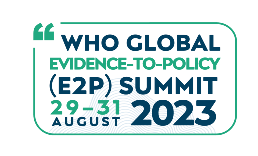By integrating Evidence-Informed Policy-Making (EIPM) into organizational structures and processes, countries can improve their policies and establish a culture of accountability and foster trust between policymakers, researchers, and the public. This session will share current tools and approaches that facilitate EIPM integration into organizational structures. Learn from successful examples and gain practical guidance to advance EIPM institutionalization in your country.
The session will provide participants with valuable insights on the institutionalization of Evidence-Informed Policy-Making (EIPM). Participants will have the opportunity to familiarize themselves with current tools and approaches that facilitate the integration of EIPM into organizational structures and processes. Speakers will share diverse approaches and tools available to support the institutionalization of EIPM, exploring how they adapted these practices within their own organizational contexts. By highlighting successful examples and sharing practical guidance, the session aims to inspire participants and empower them with the knowledge and resources necessary to advance EIPM institutionalization within their countries.
Key questions and session highlights
What are the current approaches to facilitate EIPM institutionalization?
What can be learned from the existing experiences of institutionalizing EIPM in diverse organizational contexts?
How can EIPM practices survive the governmental changes produced by electoral cycles?
![]()
Interactive session
How can WHO help to foster the institutionalization of E2P in your context?
In this session, participants will reflect on the domains of institutionalization in evidence-informed policy-making (EIPM) at the country level and explore the support offered by the World Health Organization (WHO). A brief overview of the six institutionalization domains will be shared, so that participants can identify one domain that they believe is closest to being institutionalized in their country and one domain that is far from institutionalization. Participants will also reflect, in the EVIPNet LinkedIn group, on the different types of support they believe WHO can provide for advancing EIPM institutionalization in their countries, such as training, mentoring, translation of tools, or assistance in securing funding.
The collective reflection and insights from the session will be captured using digital interactive whiteboards. This will ensure a comprehensive record of the participants' appraisal and contributions to a rich and diverse body of knowledge on evidence-informed policy-making.
Key questions and session highlights
What are the most mature and least mature domains of EIPM institutionalization in different countries?
What kind of support can WHO provide to your country to advance EIPM institutionalization?









